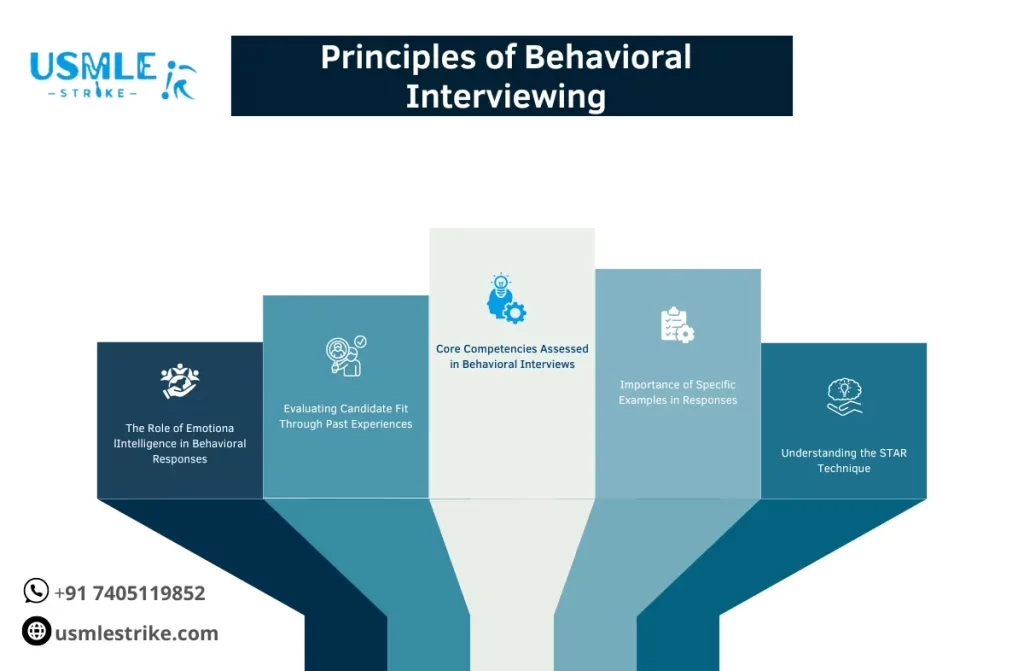Residency interview behavioral questions are a critical part of the USMLE residency selection process, designed to evaluate how candidates react in specific situations. These questions help assess qualities like teamwork, communication, problem-solving, and professionalism. Preparing for residency interview behavioral questions ensures that you are ready to present yourself as a competent, thoughtful, and adaptive candidate. This post will guide you through common types of behavioral questions, strategies for answering them, and tips for success in your residency interview.
Understanding Residency Interview Behavioral Questions
What Are Behavioral Interview Questions?
Behavioral interview questions are open-ended inquiries meant to evaluate how you’ve handled various situations in the past, providing insight into how you might behave in future scenarios. Interviewers use this format to dig deeper into your decision-making processes and reactions. Instead of theoretical questions like “What would you do if…?” behavioral questions focus on real experiences: “Tell me about a time when…”. These questions allow interviewers to gauge key soft skills and your ability to fit into a team.
Why Are Behavioral Questions Used in Residency Interviews?
Residency match programs rely on behavioral interview questions to understand how you’ll function in a high-pressure medical environment. They’re designed to explore how you’ve managed challenging patient interactions, worked within a medical team, handled conflicts, or adapted to unpredictable situations. When answering residency interview behavioral questions, your goal is to showcase your ability to maintain composure, problem-solve effectively, and work collaboratively.
How to Answer Behavioral Questions
The STAR Method: Structuring Your Answers
When faced with residency interview behavioral questions, using a structured approach like the STAR method (Situation, Task, Action, Result) is key. It helps ensure your answers are clear, concise, and relevant.
- Situation: Briefly describe the context or situation.
- Task: Explain your responsibility or goal in the scenario.
- Action: Outline the steps you took to address the issue or situation.
- Result: Please explain the results and the lessons you gained from that experience.
For instance, if asked, “Tell me about a time when you faced a challenging patient,” you would use the STAR method to detail the situation, your role, the actions you took to address the patient’s needs, and the result of your efforts.
Best way to answer behavioral interview questions is to not just focus on what happened but also reflect on what the situation taught you, how it improved your skills, and how it prepared you for residency.
Practice Makes Perfect
One of the best ways to answer behavioral interview questions is to practice by reflecting on your clinical rotations, patient care experiences, and teamwork examples. Think about scenarios where you navigated difficult situations and demonstrated essential skills like adaptability, communication, and leadership. Rehearsing these stories will help you feel more confident during the actual interview.

Common Behavioral-type Interview Questions
Teamwork Questions
Residency programs want to know if you can collaborate effectively within a team. You may encounter questions like:
- “Describe a time when you worked with a difficult team member.”
- “Tell me about a situation where you had to lead a team.”
To answer these Behavioral-type interview questions, focus on how you addressed team dynamics, mediated conflicts, or took the initiative to ensure patient care was delivered smoothly. Highlight your communication and collaboration skills, which are crucial in any residency program.
Problem-Solving and Critical Thinking Questions
Residency programs need candidates who can think on their feet and problem-solve in dynamic medical environments. Expect questions such as:
- “Can you recount an instance when you had to make a tough decision under pressure?”
- “Can you tell me about a challenging case and how you handled it?”
When tackling these Behavioral-type interview questions, emphasize how you assessed the situation, the critical thinking process you used to resolve the problem, and what the outcome was.
Communication Questions
Clear communication is essential in a hospital setting. Interviewers may ask:
- “Describe a time when you had to explain a complex diagnosis to a patient.”
- “Tell me about a time when there was a miscommunication, and how you resolved it.”
In answering these Behavioral-type interview questions, focus on how you adapted your communication style to the patient or team member’s needs and the strategies you used to clarify and resolve misunderstandings.
Ethical Dilemmas and Professionalism Questions
Medical professionals often face ethical dilemmas, and your residency interview might include questions such as:
- “Tell me about a time when you faced an ethical challenge.”
- “Describe a situation where your integrity was tested.”
The best way to answer behavioral interview questions like these is to show that you handled the situation with professionalism, sensitivity, and adherence to ethical standards. Always tie back to the importance of patient care and doing what’s right.
Preparing for Behavioral Interview Questions
Reflect on Your Clinical Experiences
Before your interview, take time to reflect on your clinical rotations, patient interactions, and teamwork experiences. Residency interview behavioral questions are designed to evaluate your past behaviors to predict your future performance. Therefore, it’s essential to think about scenarios where you demonstrated leadership, handled a challenging patient, worked under pressure, or resolved a conflict.
By being prepared with real-world examples that highlight your strengths and ability to navigate difficult situations, you’ll be able to answer confidently when asked behavioral questions.
Tailoring Your Answers to the Program
Each residency program values different skills and traits. Research the program to understand their priorities and tailor your answers to highlight how your experiences align with their goals. For instance, if a program emphasizes teamwork, ensure you prepare examples that demonstrate your ability to work well in collaborative settings.
Avoid Common Pitfalls
The best way to answer behavioral interview questions is to be honest, clear, and concise. Avoid rambling or giving too much detail about unrelated events. Stick to the STAR method, focus on your role in the scenario, and ensure your answer highlights a positive result or lesson learned. Keep in mind that interviewers want to see self-awareness, so be prepared to discuss what you could have done differently in some situations and how you’ve grown
Avoid These Errors When Answering Behavioral Questions
When answering behavioral questions in residency interviews, avoid these common errors:
- Vagueness: Provide specific examples rather than generalizations. Use the STAR method to structure your answers.
- Over-explaining: Keep responses concise and focused; don’t ramble or provide unnecessary details.
- Negativity: Avoid speaking poorly about colleagues or experiences; frame challenges positively.
- Lack of Reflection: Failing to discuss what you learned from the experience misses an opportunity to show growth.
- Ignoring the Question: Stay on topic and ensure your answer directly addresses the question asked.
Sample Residency Interview Behavioral Questions
Here are some sample residency interview behavioral questions you might encounter:
- Describe a time when you faced a significant challenge in a clinical setting. What steps did you take to overcome it?
- Tell me about a situation where you had to work collaboratively with a team. How did you contribute to the team’s success?
- Can you share an experience where you had to communicate bad news to a patient or family? How did you approach the conversation?
- Give an example of a time when you had to adapt quickly to a change in a clinical environment. What was the outcome?
- Discuss a situation where you had to manage a conflict with a colleague. What strategies did you use to resolve it?
- Describe a moment when you received constructive feedback. How did you respond and implement that feedback in your practice?
- How do you approach tasks when working under close supervision?
- Share an example of how you impressed a new patient, customer, or coworker, and explain why making a positive impression was significant.
- Can you describe a situation where you were unhappy with the quality or outcome of your work? What steps did you take to address and improve the situation?
These questions are designed to gauge your problem-solving abilities, teamwork, and communication skills.
Tips for Answering Residency Behavioral Questions
- Understand the STAR Method: Structure answers using Situation, Task, Action, and Result to narrate clear and impactful experiences.
- Practice Common Scenarios: Prepare for questions about teamwork, handling stress, and conflict resolution.
- Be Authentic: Highlight genuine experiences to demonstrate self-awareness and honesty.
- Showcase Growth: Emphasize lessons learned and how challenges improved your skills.
- Research Program Values: Align responses with the program’s mission and priorities.
- Stay Positive: Focus on solutions rather than dwelling on negatives in challenging situations.
- Keep It Concise: Be engaging without overexplaining.
Using these strategies is the best way to answer behavioral interview questions, ensuring clarity and confidence.
Should you ask questions at the end of your residency interview?
Yes, you should absolutely ask questions at the end of your residency interview. This part of the interview is a unique opportunity to showcase your genuine interest in the program and gain valuable insights about what it offers. Asking thoughtful questions demonstrates your engagement, preparation, and enthusiasm for the residency.
Focus on questions that reflect your goals and interests, such as the program’s approach to teaching, opportunities for research, or the support available for residents’ well-being. Avoid asking questions that can be easily answered by reviewing the program’s website, as this might suggest a lack of preparation. Instead, tailor your questions to the discussion during the interview or aspects unique to the program.
By engaging in this manner, you leave a lasting impression, highlighting your curiosity and professionalism. This thoughtful approach can help differentiate you from other candidates and strengthen your candidacy.
Conclusion
Residency interview behavioral questions play a crucial role in determining whether you’re the right fit for a program. By preparing well-thought-out responses using the STAR method and reflecting on your clinical experiences, you can effectively showcase your qualifications. Practicing these responses will help you confidently answer residency interview behavioral questions and increase your chances of success in the residency selection process.





